The Prague Garden Party will return to the Royal Gardens from 20 to 22 June 2025, offering visitors a mix of European food, live music, and family-friendly activities.
Now in its second year, the event combines access to the historic Royal Gardens with food stalls from more than 30 exhibitors, cultural performances, and a full children’s programme.
The central part of the event focuses on gastronomy, with a wide range of stalls presenting regional specialities.
Offerings include grilled meats, cheeses, crêpes, charcuterie, seafood, and desserts. Among this year’s featured vendors are Fransyr (European cheeses), Bread Society (French pastries), Greek Delikatessy (Mediterranean cuisine), and Milleme (quiches and desserts).
A selection of European wines, ciders, beers, and crémants will also be available from both Czech and international producers.
Live Performances and Music
The festival includes a three-day live music programme, with genres ranging from flamenco and jazz to classical and swing. Performers include Flamenkeria, Jazzpot, Pragason, Kryštof Bartošek, Cancioneta Praga, and the Sophia Lamos Swing Band.
Most concerts will take place on the Míčovna stage and in the courtyard of Queen Anne’s Summer Palace.
Visualizza questo post su Instagram
Activities for Families and Children
Daily programming for children will run throughout the festival. Children under 15 can enter for free, and primary school pupils will receive sweet treats in recognition of the end of the school year.
Venue and Tickets
The event is set in the Royal Gardens of Prague Castle, including the Belvedere terrace and views of the city. Visitors are welcome to bring blankets and enjoy the grounds picnic-style.
Opening hours are from 10:00 to 20:00 each day. Day tickets are priced at 150 CZK, while a three-day pass is available in advance for 200 CZK on goout.net until 15 June. After that, full-price passes cost 350 CZK.
The gardens are accessible via tram lines 22 and 23, or through the Prague Castle complex.
Would you like us to write about your business? Find out more
In Czechia, eating out during the workday has become a growing luxury.
According to the latest Edenred Restaurant Index, the cost of lunch has risen steeply across the country – and nowhere more so than in Prague.
The average lunch menu in the capital now costs 220 CZK, making it the most expensive in the country. Just behind is Brno, where employees pay 208 CZK for a midday meal.
Meanwhile, cities like Zlín, Ústí nad Labem, and Olomouc remain on the more affordable end, with prices up to 55 crowns lower.
The national average for a lunch menu now stands at 196 CZK, highlighting a steady climb in prices that has outpaced wage growth. Since 2014, lunch prices have jumped by more than 130%, while average salaries rose by roughly 82% over the same period.
Back in 2020, workers in Prague paid just 149 CZK on average for lunch. In cities like Ostrava or Jihlava, it was even cheaper—hovering just over 120 CZK. But the most dramatic comparison goes further back. In 2014, Prague diners paid only 98 CZK, while in the Pardubice Region, lunch cost a mere 75 CZK. In a decade, the price of lunch has more than doubled across Czechia.
“It wasn’t that long ago that a lunch menu under 100 CZK was standard across the country. Now, that price is almost unimaginable in most places,” says Aneta Martišková from Edenred. She adds that the price hike has had a visible effect: the number of people eating out for lunch has dropped by 21% in recent months.
Despite the fall in customers, prices are expected to continue rising. Economic pressures, ingredient costs, and energy prices are pushing restaurants to adjust their lunch menus accordingly, Martišková warns.
The gap between the capital and other regions also seems unlikely to close soon. While Prague’s business districts sustain higher prices, cities like Zlín remain more affordable, partly due to lower operational costs and different consumer habits.
Would you like us to write about your business? Find out more
Amid rising military tension in the Middle East, Prague’s Václav Havel Airport has suspended all flights to and from Israel.
The cancellations were confirmed early Friday morning via the airport’s official account on the X social media platform.
Airport authorities cited security concerns due to escalating conflict between Israel and Iran, urging travelers to monitor the airport’s website for updates and to stay in touch with their airlines for the latest information.
“There is a gradual cancellation of all flights with Israel due to the deteriorating political situation,” said the airport, located in Prague’s Ruzyně district. Direct connections between Prague and Tel Aviv—Israel’s second-largest city—have been suspended until further notice.
Due to the current political situation, flights to and from Israel are being gradually suspended. Passengers are kindly advised to check the latest status of their flight on the airport’s website and contact their airline for further information. pic.twitter.com/UlJ8gsj1qw
— Prague Airport (@PragueAirport) June 13, 2025
According to the airport’s schedule, four outbound flights to Tel Aviv were originally planned for Friday. One has already been canceled, and all five incoming flights from Tel Aviv to Prague have also been called off.
The decision follows a major Israeli aerial offensive launched overnight, during which over 200 aircraft dropped more than 330 munitions on roughly 100 targets across Iran, according to the Israeli Defense Forces.
In response, Iran deployed over 100 drones aimed at Israeli territory—some of which are expected to reach their targets within hours.
Israeli Prime Minister Benjamin Netanyahu stated that the operation was intended to strike nuclear scientists allegedly working on a bomb, the Natanz nuclear facility, and Iran’s ballistic missile infrastructure.
Analysts suggest the scale of the Israeli assault could mark the largest military strike against Iran since the Iran-Iraq War in the 1980s.
Would you like us to write about your business? Find out more
Michael Douglas will present a newly restored print of Miloš Forman’s “One Flew Over the Cuckoo’s Nest” at Karlovy Vary Film Festival next month.
The 1975 classic, which celebrates its 50th anniversary this year, will screen as part of the festival’s Out of the Past section. The film was restored by the Academy Film Archive.
Douglas will be joined at the Gala Screening by Paul Zaentz — nephew of the late Saul Zaentz, who produced the film with Douglas — as well as members of Forman’s family.
The film made Oscar history as only the second to win all five major Academy Award categories: picture (Douglas and Zaentz), director (Forman), actor (Jack Nicholson), actress (Louise Fletcher), and adapted screenplay (Lawrence Hauben and Bo Goldman).
The screening also honors Karlovy Vary’s ties to the film. Forman was a loyal supporter of the festival, and he, along with Douglas, Zaentz and actor Danny DeVito, who also appeared in the film, are all recipients of the festival’s Crystal Globe for outstanding artistic contribution to world cinema.
“We are truly honored to present ‘One Flew Over the Cuckoo’s Nest’ on its 50th anniversary,” said the festival’s executive director Kryštof Mucha. “The presence of Michael Douglas, Paul Zaentz and the Forman family will make this an unforgettable moment in the festival’s history.”
Adapted from Ken Kesey’s novel, “One Flew Over the Cuckoo’s Nest” follows Randle McMurphy, a rebellious gambler whose defiance of authority challenges the rigid confines of a mental institution. A powerful parable of freedom versus control, the film marked a turning point in Forman’s career and paved the way for his later international successes.
Douglas last visited Karlovy Vary in 1998, when he and Saul Zaentz were honored with the Crystal Globe.
Paul Zaentz worked closely with Forman on “Amadeus” (1984) and “Goya’s Ghosts” (2006), and produced acclaimed titles including “The English Patient” (1996) and “The Talented Mr. Ripley” (1999).
Would you like us to write about your business? Find out more
The European Court of Human Rights has ruled that the Czech Republic violated the rights of a non-binary person by requiring sterilisation as a precondition for legal gender recognition.
The case was brought by T.H., a non-binary person who has spent over a decade fighting for the right to change their legal gender and personal identification number without being forced to undergo sterilisation.
Czech authorities consistently rejected the request, citing national law, which still mandates surgical sterilisation for legal gender changes.
In today’s judgment, the Strasbourg-based court declared that this requirement breaches Article 8 of the European Convention on Human Rights, which guarantees the right to private life. The Court emphasized that the Czech Republic must provide a clear legal framework that allows trans people to update their gender marker without invasive medical procedures.
While the Czech Constitutional Court overturned the sterilisation mandate in 2024, it delayed the change until July 1, 2025, giving the government time to prepare a new law. However, no viable legislation has been passed. The issue now hangs on non-binding ministerial guidelines, which have yet to be published and could be easily reversed after elections later this year.
T.H., the claimant in the case, welcomed the decision. “This is a great day for non-binary and trans people,” she said. “It’s essential that Europe follows a path of dignity, equality, and human rights — especially amid global efforts to roll back trans rights.”
T.H. has never identified with the male gender assigned at birth and uses she/her pronouns. For medical and personal reasons, she does not wish to undergo sterilisation.
Since 2012, she has filed multiple requests with the Czech Ministry of the Interior, all of which were denied due to her refusal to undergo surgery. After exhausting domestic legal options — including a failed appeal to the Constitutional Court in 2021 — she took her case to the European Court.
The 2024 Constitutional Court ruling, which came in a separate case involving a trans man, struck down the sterilisation requirement, calling it incompatible with human dignity. Yet, the absence of a new legal framework has left many in limbo. Without clear rules, decisions about gender recognition could shift with each new administration.
“This is one of the most serious human rights issues of the last decade in Czechia,” said Maroš Matiaško, T.H.’s lawyer. “The Court’s judgment not only provides closure, but also sends a strong message to the Czech government: adopt a safe, accessible, and dignified legal process.”
The ruling reflects broader European trends. According to the National Institute of Mental Health, 90% of Czech trans people oppose the sterilisation requirement.
Would you like us to write about your business? Find out more
Get ready for a stage experience like no other — an intense, immersive retelling of A Clockwork Orange is coming to Prague this June.
It will be performed at Rock Café on June 13 and 15 at 19:00, this adaptation blends ballet, opera, and physical theatre with the dark, dystopian world of Anthony Burgess’s cult classic.
The result is an artistic collision between beauty and violence, refinement and raw brutality.
At the center of the story is Alex, a teenage gang leader whose descent into crime, incarceration, and state-sponsored reform forces the audience to confront uncomfortable questions about power, control, free will, and redemption.
This version of A Clockwork Orange isn’t just theatre — it’s a sensory assault. Expect Beethoven, “a bit of the old ultra-violence,” and a jarring mix of classical and contemporary forms, all brought to life by an international creative team.
Directed by Christopher Adamson, co-founder and artistic director of D’Prompt Theatre, the show features choreography by Jade Becker of the First International Ballet School in Prague, with vocal coaching by Sav Bea, founder of Sav Bea Academy.
The production is led by Gordon L. Schmitz and his collective, The Mad and Merry Men.
Schmitz believes the story’s relevance has never been greater.
“There’s a strange absence of political counterculture today — either it’s been mainstreamed or replaced with the idolisation of corporate power. But then something shocking happens — a CEO is assassinated in New York and the killer is hailed as a folk hero. We’re closer to this dystopia than we think,” he says.
First published in 1962, A Clockwork Orange has left a lasting mark on literature, cinema, and music.
Its themes — the fight between the individual and the state, the moral cost of control, and the question of whether true reform is possible — remain as relevant now as they were over 60 years ago.
Would you like us to write about your business? Find out more
Prague is no longer just a destination — it’s now a game.
Prague City Tourism (PCT) has released a mobile puzzle game called Playing Prague, aiming to promote the city through a blend of interactive storytelling, architecture, and local legends.
Created by independent studio Charles Games for 1.5 million CZK, the project is at the heart of this year’s Prague.eu and In Prague Like Home marketing campaigns.
According to PCT spokeswoman Klára Janderová, the game is now available for free in three languages — Czech, English, and German — on Google Play and the App Store.
Players solve strategic puzzles as they build iconic Prague monuments across different city districts. Each level highlights a different neighborhood and increases in difficulty. Along the way, users meet historical and cultural figures — from Mozart to Věra Čáslavská — all of whom have shaped Prague’s identity.
Charles Games’ developer Lukáš Kolek explains that the gameplay merges relaxation with challenge: “You build the city by combining tiles, unlocking levels dedicated to famous locations like the Powder Tower, Charles Bridge, or Petřín.”
He adds, “We tried to capture Prague’s distinct atmosphere — a city we love deeply. At the same time, we wanted to offer players the chance to build their own version of Prague.”
“We spent a whole year building this tribute to Prague,” said a representative from Charles Games. The game currently includes six levels, but future expansions are planned.
Players will explore Prague’s house signs, uncover the meaning behind each symbol, and reconstruct the city’s most iconic landmarks — all while learning about the personalities that shaped it.
Would you like us to write about your business? Find out more
Czech transportation company RegioJet has launched its seasonal direct bus connection from Prague to the Croatian coastal city of Split for the second consecutive year.
The service, running through October 2025, aims to offer a convenient and affordable alternative to summer travel by plane or car.
The new route is operated by RegioJet’s most modern double-decker coach, the Setra S 531 DT. This top-of-the-line vehicle includes a new “Fun&Relax⁺” section offering enhanced comfort, alongside the standard seating options.
The journey, scheduled to last approximately 17 hours, includes planned stops in Brno, Bratislava, and several Croatian cities along the way. While the route currently runs three times a week, daily departures will begin from June 16.
Tickets start at CZK 1,590 for a standard seat, while seats in the Fun&Relax⁺ section are available from CZK 1,900. This upgraded section is located on the upper deck and features three seats per row instead of the usual four, offering more legroom and personal space.
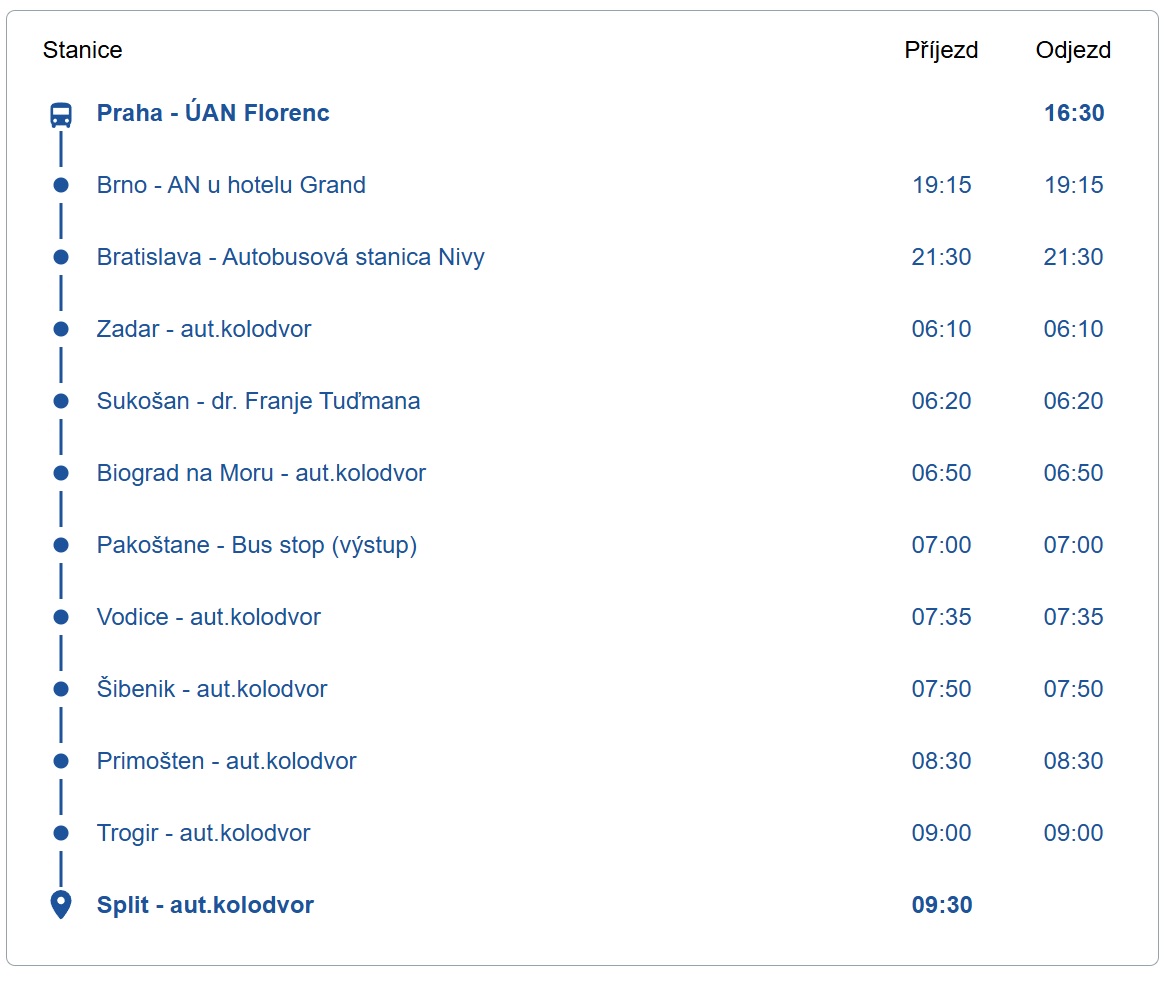
Every seat in the comfort section is equipped with an integrated multimedia system, USB and USB-C charging ports, and a full 220V power outlet. Passengers can also take advantage of free Wi-Fi, climate control, and onboard restrooms.
On the lower deck, the bus features a standard 2+2 seating layout, including two family areas with tables, making it a flexible option for both solo travelers and families.
Last summer, RegioJet discontinued its Prague–Croatia train service, which had operated successfully for four years. The company decided to focus rail operations on routes to Ukraine, citing growing demand.
In response, the new bus service now fills the gap for passengers heading to the Adriatic coast.
Would you like us to write about your business? Find out more
Czech Prime Minister Petr Fiala appointed a new justice minister on Tuesday to replace political veteran Pavel Blažek, who triggered a political storm when he accepted a payment to the state from an ex-convict worth $45 million in bitcoin.
Outcry over the payment could dent the ruling coalition’s chances in an October 3-4 election in which they trail the opposition.
Blažek, a respected lawyer, has said he did nothing illegal but resigned his post and quit Fiala’s Civic Democrat (ODS) party after accepting the donation from a man convicted of running an online drug market.
Fiala named Eva Decroix as the new justice minister and said she was coming at an important time “to restore trust in the ministry and ensure full transparency around the donated bitcoins.” He told her to request an immediate independent audit.
The man who made the donation of 468 bitcoins was in jail from 2017 until 2021 after being convicted of involvement in the drug trade, fraud and illegal possession of weapons.
The opposition ANO party plans a no-confidence vote in the government that is likely to fail but may harm Fiala and his allies in voters’ eyes.
Blažek was attacked for possibly legitimising the ex-convict’s assets, instead of turning to prosecutors or police to help secure them.
Opposition leader Andrej Babis, a former prime minister whose ANO party looks on course to win the most votes in October’s election, has blasted the government for corruption.
Would you like us to write about your business? Find out more
The Royal Garden of Prague Castle will once again host one of the most anticipated beer events of the year.
On June 13–14, 2025, the Microbrewery Festival returns for its 13th edition, offering visitors the chance to sample more than 50 craft beers from Czech and Moravian microbreweries, alongside special guests from Belgium.
Organized by the Czech-Moravian Microbrewery Association, the event combines world-class beer with one of the most scenic backdrops in Prague.
Held on the Shooting Trail beneath the Royal Summer Palace, the open-air festival provides panoramic views of the city, making it as much a visual experience as a tasting one.
For security reasons, entry is capped at 1,200 visitors per day, creating a relaxed and uncrowded atmosphere. Tickets include unlimited tastings, a souvenir tasting glass, and a festival catalog listing participating breweries.
The event begins Friday, June 13 at 1:13 PM—a nod to its 13th year—and runs until 8:00 PM. On Saturday, June 14, doors open at 12:00 PM and close again at 8:00 PM.
In addition to beer lovers from across Czechia, the event draws attendees from Ireland, Belgium, Sweden, Austria, the UK, Canada, and the United States—all eager to experience Czech beer culture in a unique setting.
Tickets are available online at smsticket.cz, and tend to sell out fast due to limited capacity.
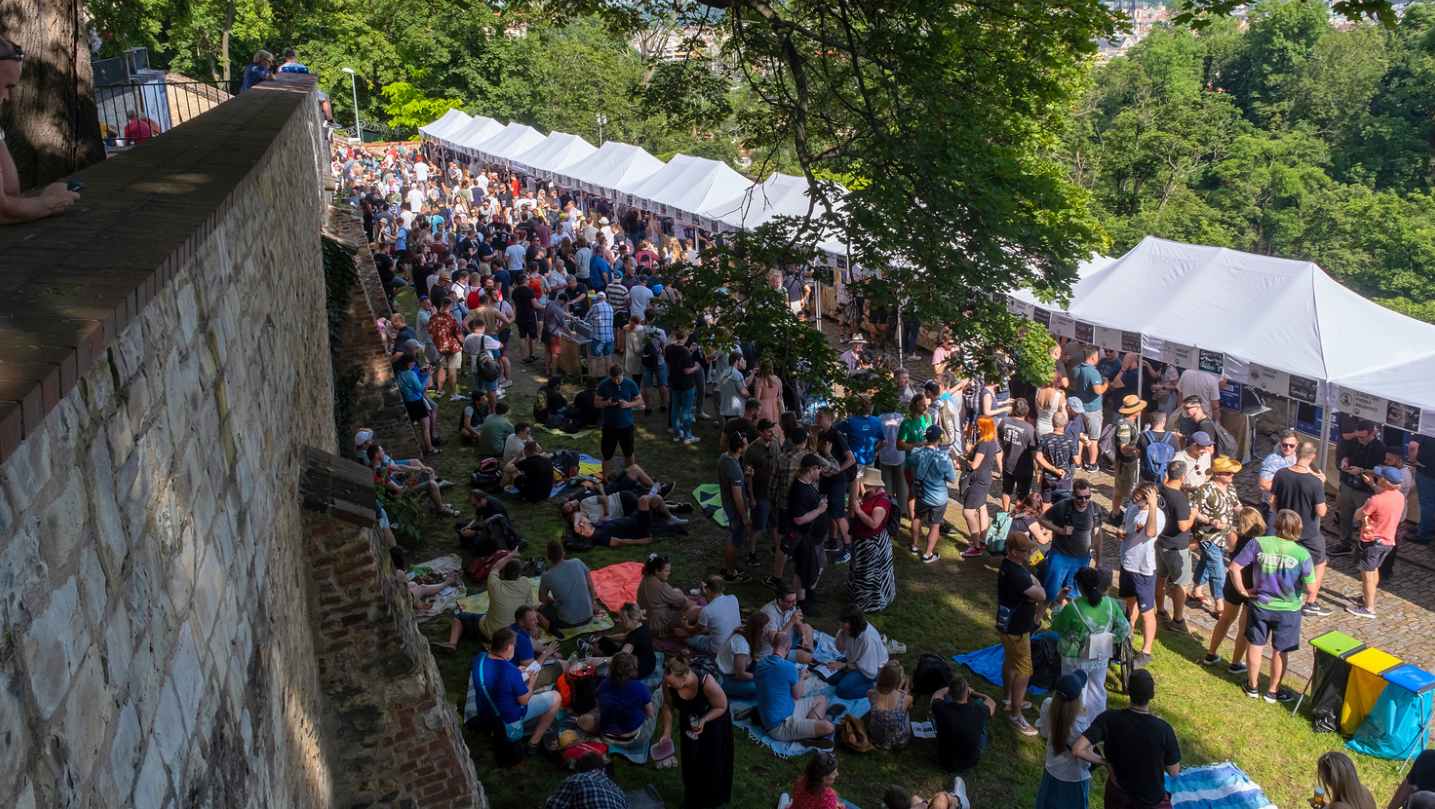
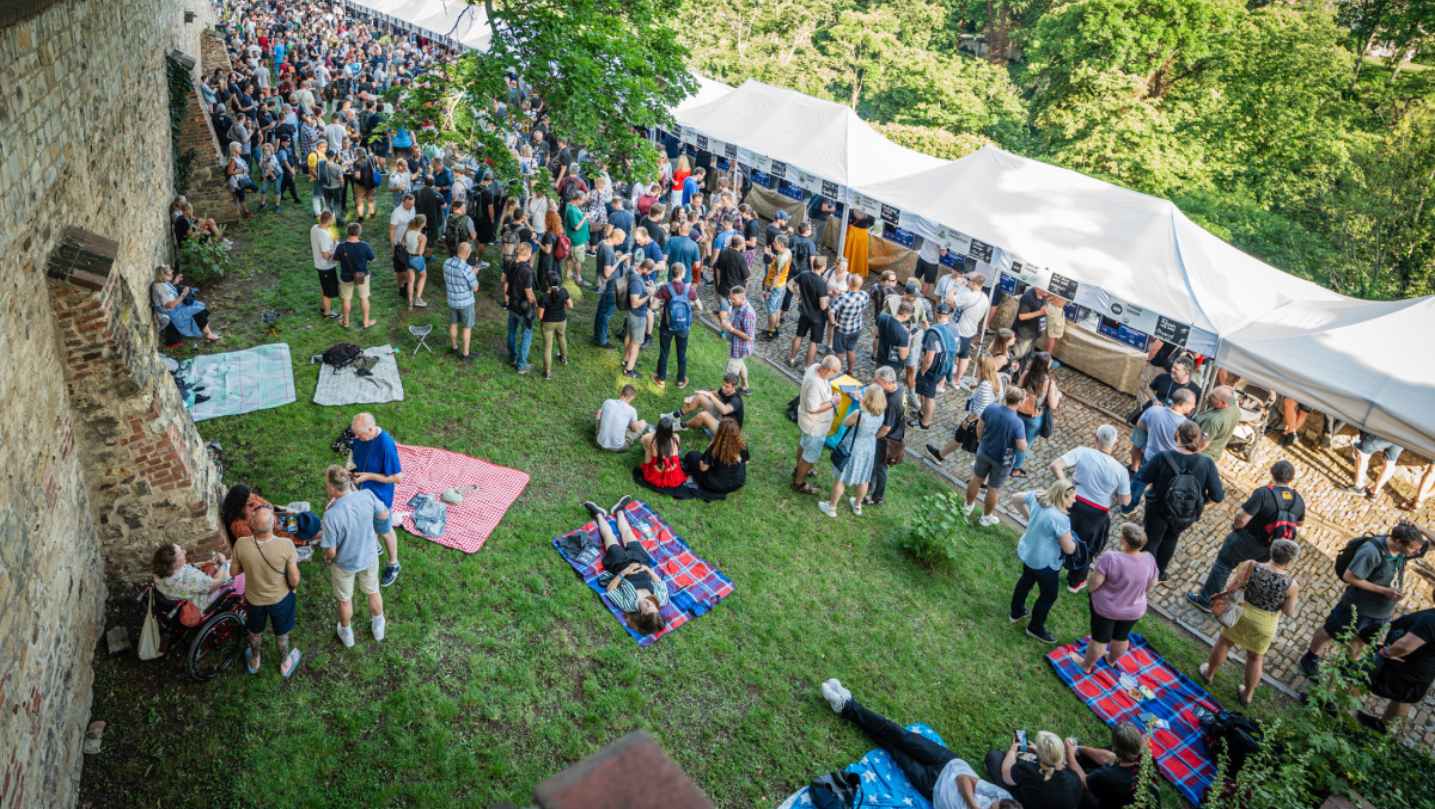
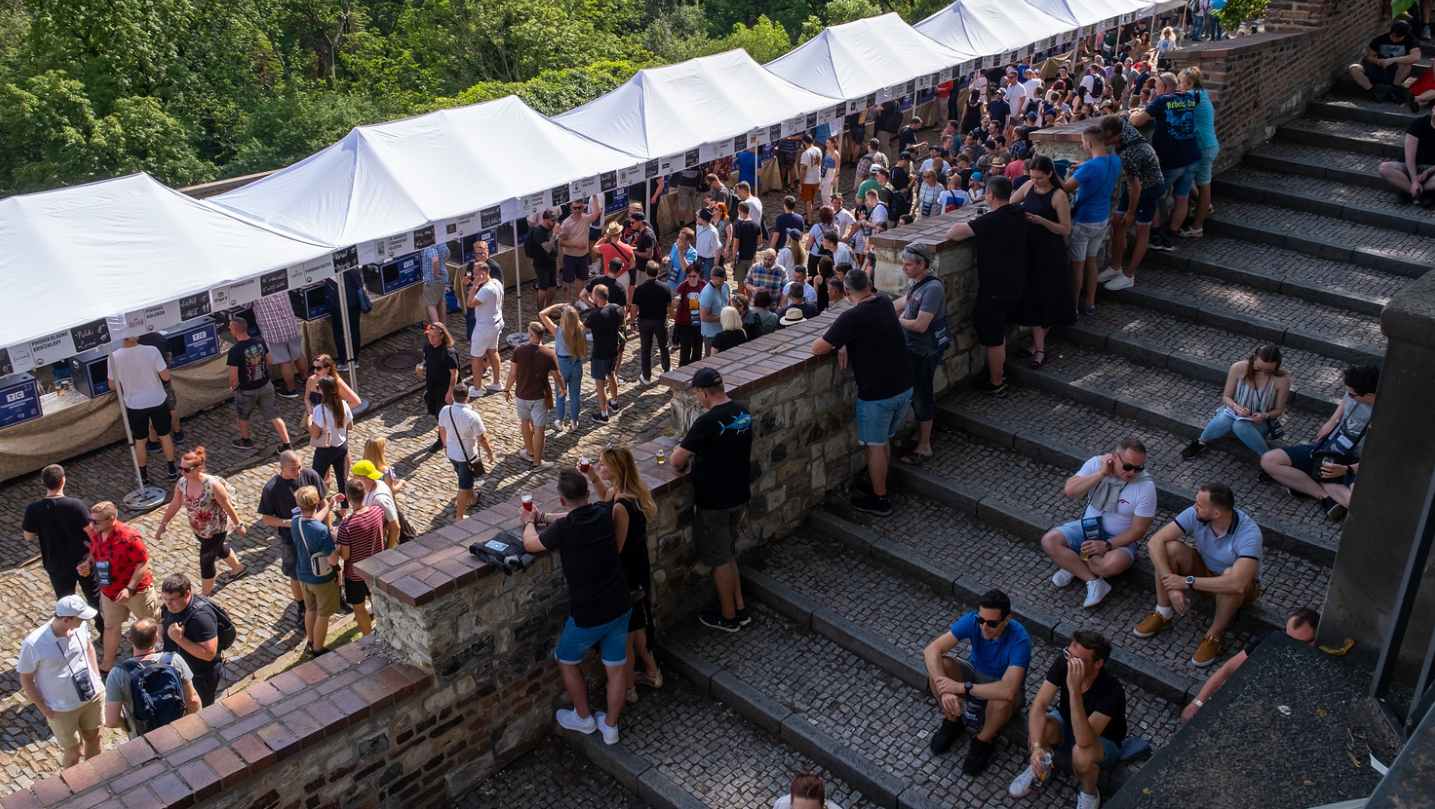
Would you like us to write about your business? Find out more
Prague Open Air 2025 will kick off on Tuesday, June 17, and run through Saturday, September 20, bringing a packed summer of open-air concerts to the Czech capital.
This year’s edition spans four venues: Riegrovy sady, Občanská plovárna, Terasa Smíchov, and the festival’s newest addition, Areál 7 in Holešovice.
After years at Ledárny Braník, organizers decided it was time for a change.
“We had outgrown the space at Ledárny,” said Tomáš Staněk, one of the event’s key organizers. “Areál 7 offers more room and can be adjusted depending on the number of visitors. It’s also better connected by public transport.”
The decision wasn’t based only on space constraints. Noise complaints from nearby residents had long plagued the Ledárny venue.
At one point, pressure from locals prompted the Prague municipality to propose a decree regulating large public events. This sparked backlash from the artistic community.
Musicians and event promoters launched a petition, warning the move could lead to a “shutdown of culture” in the city.
Former city councilor for legislation Hana Kordová Marvanová criticized the petition, calling it misleading. But rather than enforce sweeping restrictions, she met with organizers. Both sides agreed the issue wouldn’t be solved by regulation alone—it required cooperation and dialogue.
Ticket prices for Prague Open Air 2025 range from 500 to 800 CZK, offering an affordable way for audiences to enjoy live music under the open sky.
Full program:
June
July
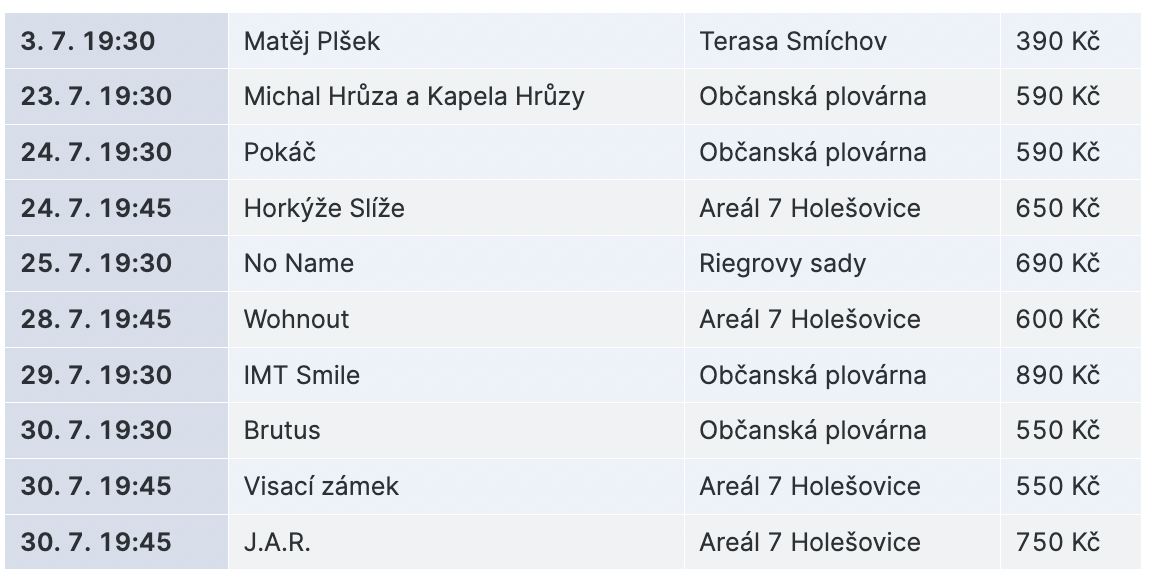
August
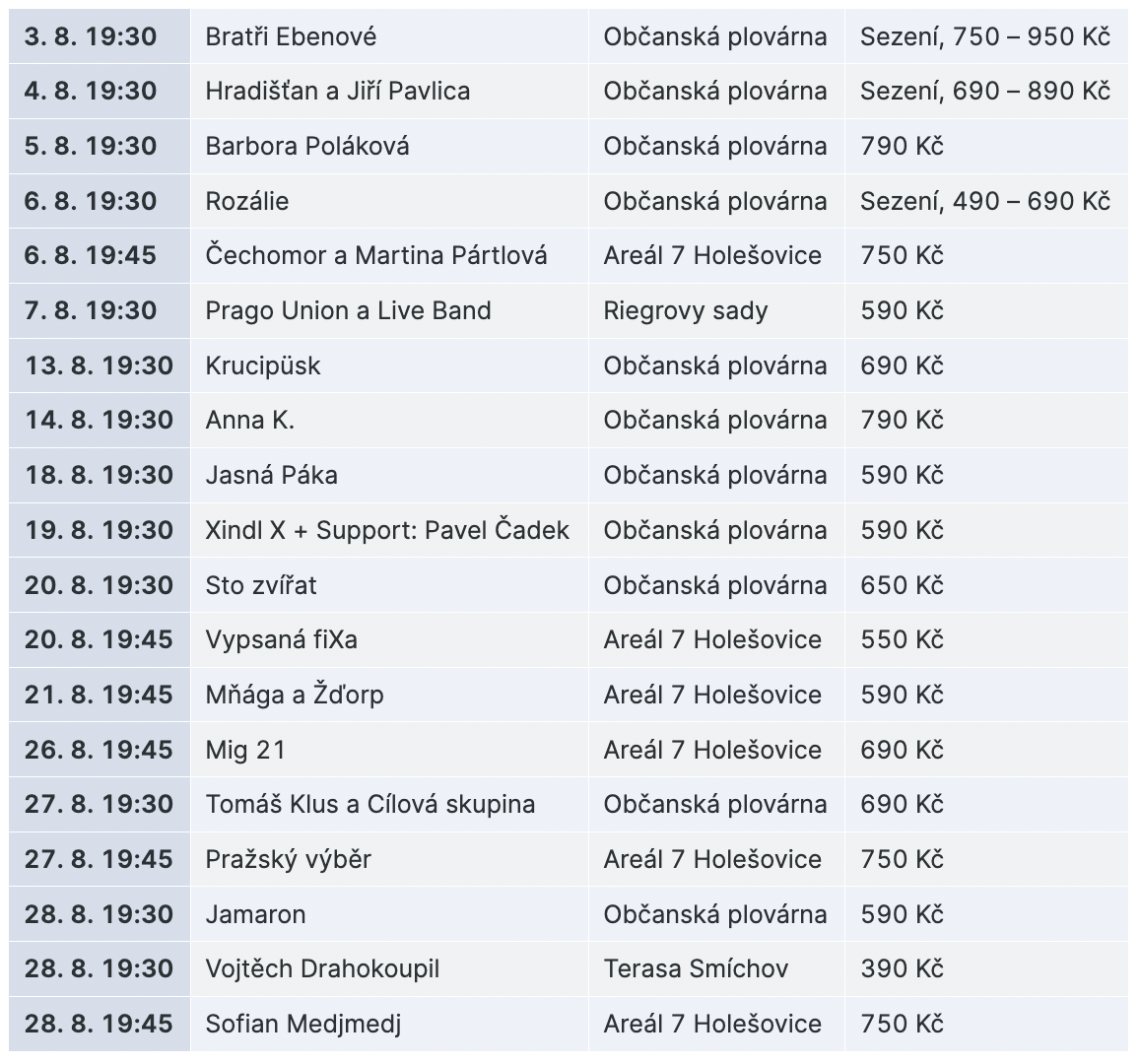
September
Would you like us to write about your business? Find out more
Prague’s cost of living is rising at twice the national pace, according to new data from the Czech Statistical Office.
While the Czech Republic recorded an average inflation rate of 2.4% in May, prices in the capital climbed by 3.6%, underscoring Prague’s growing economic disconnect from the rest of the country.
This gap isn’t just about numbers—it reflects deeper structural differences in housing, services, and lifestyle patterns in the city compared to the rest of Czechia.
“Inflation in Prague stands out due to faster growth in housing costs,” says Petr Dufek, chief economist at Creditas Bank. “Just the increase in apartment prices alone added 0.7 percentage points to the city’s inflation.”
Although the Czech National Bank (CNB) has mostly kept inflation within its target range of 2% ± 1 percentage point, Prague is becoming a statistical outlier.
Housing and services are the main culprits. According to economist David Marek from Deloitte, services make up a larger part of consumer spending in Prague than elsewhere in the country.
This shift in consumer behavior contributes to higher localized inflation, particularly as service prices continue to climb faster than those of goods.
A breakdown of inflation reveals the largest price increases occurred in food, accommodation, culture, and education—sectors where Prague consistently outpaces the rest of the country. For example:
- Food and accommodation costs rose by 5.3% in Prague, compared to 4.6% nationwide.
- Grocery prices climbed 5.6% in the capital, slightly more than the 5.4% national average.
- Spending on culture and education surged by more than 8% year-on-year in Prague.
Some price categories did offer minor relief. Costs for telecommunications, household goods, and some services dipped slightly in Prague, but these savings were outweighed by rising energy prices, which hit consumers across the country.
This inflationary divergence is nothing new. In 2023, the cost of living in Prague rose by 4%, while the national average increase was just 3%. These differences continue to reinforce the notion of Prague as a “state within a state”—with its own economic rhythm.
While May’s national inflation figure of 2.4% was only slightly above the CNB’s forecast, central bankers remain cautious.
Petr Sklenář, head of the CNB’s monetary section, noted that price stability has not yet been fully restored, warning that monetary policy must proceed carefully.


